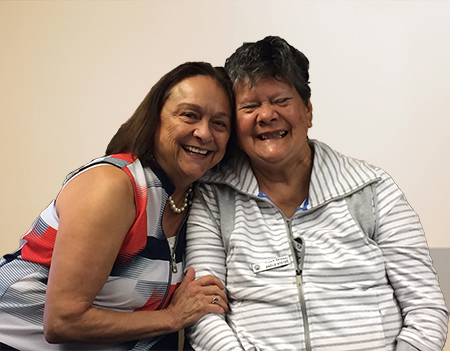
It’s Never Too Late to Find Community
by Patricia Forgey
“I want a hug!”
…Of course, I said “yes!”! My first interaction with Tilla told me so much about her spirit, her nature – about whom she is and the person she has become. The support and advocacy of her sister and membership in the Friendship Center, being part of the Center’s activities and finding many friends there, has been life changing for Tilla. As Debra Ermac, Tilla’s sister, arrives in the library at Friendship Center, she is greeted by Tilla’s brilliant smile. The two sisters have renewed their life-long bond since Tilla moved to Santa Barbara twelve years ago.
Tilla was born in 1950, when intervention services for children with developmental disabilities were rarely available. Children with developmental challenges were misunderstood. Physicians routinely advised families to place their children in institutional care settings. Tilla’s early memories resonate with the difficulties of her childhood. She remembered poignantly, “I couldn’t walk and I couldn’t talk.” Tilla grew up without intervention services. And, Debra, recalls, “We were all clueless.”
As an adult, Tilla remained in the background of the family. She qualified for Supplemental Security Income (SSI) payments in adulthood, but did not have access to the funds. Tilla’s mother managed these resources with the explanation, “My daughter does not know how to count money.”
Debra shares that, “We’ve always been very close. When our mom died, my husband and I traveled to Corona regularly where Tilla then lived with our father; I wanted to make sure that she was okay.” When their father died, Tilla confessed, “I was kinda worried. I was crying because I didn’t know who would take care of me.”
When Debra and her husband moved Tilla to Santa Barbara to live with them, the work began to support Tilla to say the words she was thinking and make her choices known. Debra learned more about this sister who had been silent and unempowered in her life. “We would ask her, ‘what would you like for dinner?’ She would never ask us or tell us what she wanted.” This is how we were raised, to be silent. Tilla was always told what to do and she just followed along.
Debra described her own form of intervention for her sister. “We worked really hard. It took years for Tilla to understand that she could speak up for herself. She needed to say, ‘I don’t want chocolate – I want vanilla.’”
“Well, you did a good job with that,” notes Luciana Mitzkun, Director of Family Services. , “I’m surprised that this is the same Tilla whom I now know!”
Tilla says to Debra, “I’m very thankful that you took me in” and … (now) I would like to learn to count money!
As Debra and Luciana describe the Tilla who is a member at Friendship Center, a woman with a sense of humor, communication and mobility skills, and a heart for old and new friends, her sister relates, “I’m so proud of you; my heart just rolls over!” says Debra. She recalls that, “It took awhile for her to learn about appropriate words; she would come across as impolite. We would practice at home all of the time for table etiquette and conversation with others.” As Tilla spoke more, her speech became clearer and Debra experienced the gift of truly knowing her sister. “I enjoy her sense of humor,” adds Debra, “She tells me that I don’t have one!”
Tilla’s days are filled with her hospitality as she greets new arrivals at Friendship Center and assists in the dining room. In addition to the activities of art, music and socialization at Friendship Center, Tilla enjoys daily affirmations and listens to meditative music.
In 2014, Tilla moved to Comforts of Home, a licensed home in Goleta. Debra knew that Tilla needed a community life. She brought Tilla to Friendship Center’s Montecito location for a tour. With one visit, that included the spacious open-air courtyard surrounded by palatial trees, the rooms for art, tai chi, and other activities along with the dining room decorated with members’ art – she was sold! During her annual IPP meeting with her Service Coordinator, Tilla requested, “I want to say something – I want to go to Friendship Center.”
This delightful woman, now speaking her mind, making choices, and being there for others, has made her way to a new life, from one of confinement, absent communication skills and a deficit for the joy of life. Her sister’s concern, advocacy and support, and the lively and creative environment of the Friendship Center, pulled Tilla into her full life with every day now being a good day.
Friendship Center, a licensed, non-profit adult day services program, serves older adults with developmental disabilities as well as those experiencing the effects of dementia. Locations in Goleta and Montecito provide opportunities to socialize and enjoy innovative programs to maintain quality of life along with Healthy Aging Courses. Learn more at www.friendshipcentersb.org
